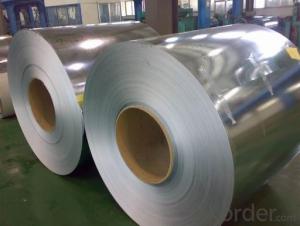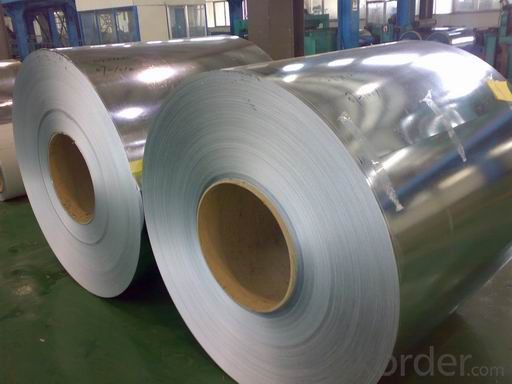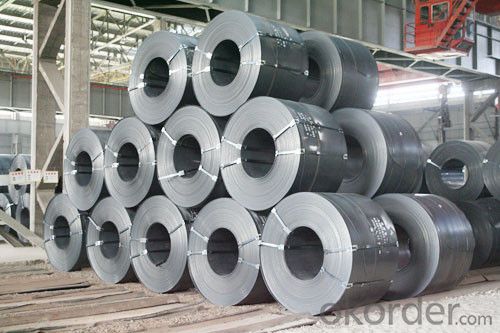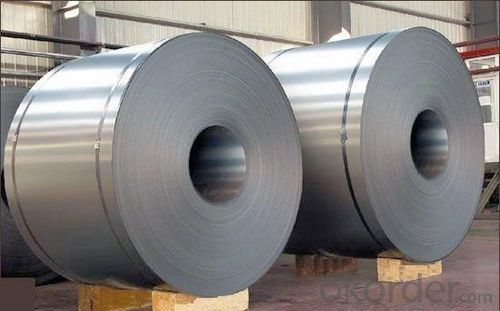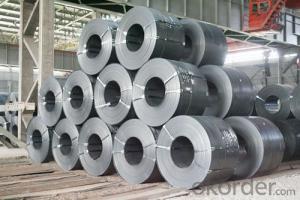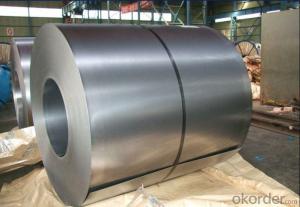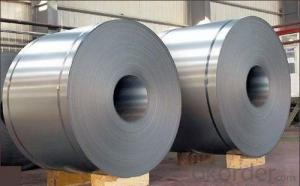Grade Q450NQR1 Corten Steel Coil 2.0*1250*C
- Loading Port:
- Shanghai
- Payment Terms:
- TT or LC
- Min Order Qty:
- 100 m.t
- Supply Capability:
- 20000 m.t/month
OKorder Service Pledge
OKorder Financial Service
You Might Also Like
Grade Q450NQR1 Corten Steel Coil 2.0*1250*C
Description:
-Grade: 09CuPCrNi-A
-Specification: 2.0*1250 in coil
Chemical Composition(%) of Grade Q450NQR1 Corten Steel Coil 2.0*1250*C:
| C | Si | Mn | P | S | Cu | Ti/V | Cr | Ni | RE |
| ≤0.12 | 0.25~0.75 | 0.20~0.50 | 0.060~0.12 | ≤0.020 | 0.25~0.50 | / | 0.30~1.25 | 0.12~0.65 | / |
Mechanical Properties of Grade Q450NQR1 Corten Steel Coil 2.0*1250*C:
| Thickness(mm) | Y.S(MPa) | T.S(MPa) | EL. A5% | Bend 180o | Impact Test | |
| oC | AKV J | |||||
| 2.0~≤6.0 | ≥345 | ≥480 | ≥24 | d=a | Normal/-40 | ≥47/≥21 |
| >6.0~12.0 | d=2a | |||||
Application of Grade Q450NQR1 Corten Steel Coil 2.0*1250*C:
Used in different weather. It has good anti rust protection and welding ability and is used in shipping container,support frame of outside building etc. Remarkably enhances the anti-corrosive performance of the structural element, lengthens the structural element service life, uses in manufacturing each kind of structural element which was used under the atmospheric envirenment and the caustic gas, the liquid envirenment.
Payment:
-Invoicing on theoretical weight or actual weight as customer’s request.
-FOB, CFR or CIF.
-Regular terms of payment:
1, 30% payment in advance, the remaining balance (70% payment) against the copy of B/L.
2, 30% payment in advance, the remaining balance (70% L/C) against the copy of B/L.
3, Negotiable.
-The payment terms will be written in contraction detailedly.
FAQ:
Q1: Why buy Materials & Equipment from OKorder.com?
A1: All products offered byOKorder.com are carefully selected from China's most reliable manufacturing enterprises. Through its ISO certifications, OKorder.com adheres to the highest standards and a commitment to supply chain safety and customer satisfaction.
Q2: How do we guarantee the quality of our products?
A2: We have established an advanced quality management system which conducts strict quality tests at every step, from raw materials to the final product. At the same time, we provide extensive follow-up service assurances as required.
Q3: How soon can we receive the product after purchase?
A3: Within three days of placing an order, we will arrange production. The shipping date is dependent upon the quatity, how many sizes you want and the plan of production, but is typically 1 month to 2 month days from the beginning of production.
Images of Grade Q450NQR1 Corten Steel Coil 2.0*1250*C:
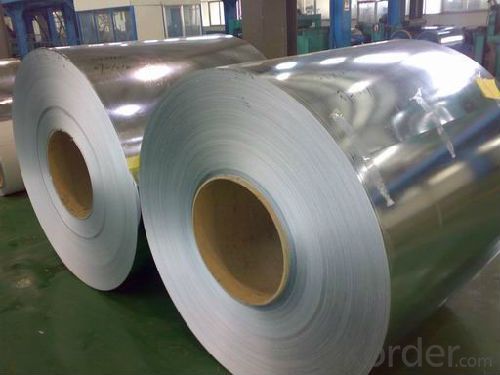
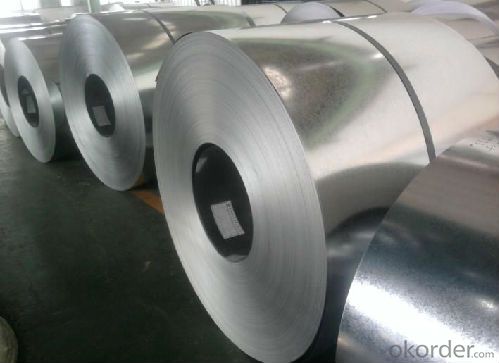
*If you would like to get our price, please inform us the size, standard/material and quantity. Thank you very much for your attention.
- Q: What are the international standards for special steel?
- The international standards for special steel are a set of guidelines and specifications established by organizations such as the International Organization for Standardization (ISO) and the American Society for Testing and Materials (ASTM). These standards outline the requirements for various properties of special steel, including its chemical composition, mechanical properties, and manufacturing processes. They ensure that special steel products meet the necessary quality and performance criteria for use in industries such as automotive, aerospace, and construction worldwide.
- Q: How does special steel contribute to the industrial machinery aftermarket industry?
- Special steel plays a crucial role in the industrial machinery aftermarket industry by providing high-quality and durable components that enhance the performance and longevity of machinery. One of the main contributions of special steel to this industry is its exceptional strength and resistance to wear and tear. Industrial machinery is subjected to heavy loads, extreme temperatures, and corrosive environments, which can cause regular steel components to deteriorate quickly. However, special steel alloys are specifically designed to withstand these harsh conditions, ensuring that the machinery operates efficiently for an extended period. Moreover, special steel offers excellent machinability, making it easier to manufacture intricate and precise components. This enables aftermarket manufacturers to produce replacement parts that perfectly fit into existing machinery, minimizing downtime during repairs and maintenance. Additionally, special steel's machinability allows for customization, as it can be easily shaped and modified to meet the specific requirements of different machinery models. Furthermore, special steel's exceptional heat resistance makes it ideal for the production of high-temperature components used in industrial machinery. These components, such as turbine blades or furnace parts, need to withstand intense heat without losing their structural integrity. Special steel alloys possess excellent heat resistance properties, ensuring that the machinery can operate at high temperatures without compromising performance or safety. Additionally, special steel contributes to the industrial machinery aftermarket industry by providing corrosion-resistant components. Many industries, such as oil and gas or marine, expose machinery to corrosive substances or environments. Regular steel components are susceptible to corrosion, leading to premature failure and costly repairs. However, special steel alloys are highly resistant to corrosion, enhancing the durability and reliability of machinery in these demanding conditions. Overall, special steel's unique properties, including strength, machinability, heat resistance, and corrosion resistance, significantly contribute to the industrial machinery aftermarket industry. By utilizing special steel components, manufacturers can enhance the performance, durability, and longevity of machinery, reducing downtime, and improving overall operational efficiency.
- Q: How does special steel perform in extreme pressure conditions?
- Special steel offers exceptional performance in conditions of extreme pressure, thanks to its unique composition and manufacturing process. It possesses high strength, durability, and resistance to deformation, which make it ideal for applications involving extreme pressures. Under extreme pressure, special steel maintains its structural integrity without significant deformations. This is possible due to its impressive tensile strength, allowing it to withstand tremendous forces without breaking or bending. Furthermore, the hardness and toughness of special steel enable it to resist wear and damage caused by intense pressure. In addition, special steel exhibits excellent heat resistance, which is vital in extreme pressure situations where elevated temperatures are common. Its ability to withstand high temperatures without compromising its mechanical properties ensures its dependability and effectiveness even in the most demanding circumstances. Moreover, the corrosion resistance properties of special steel are outstanding, making it suitable for use in extreme pressure environments where exposure to corrosive substances is a concern. Its resistance to oxidation and other chemical reactions prevents deterioration or weakening, guaranteeing long-term performance and reliability. Overall, special steel excels in extreme pressure conditions due to its high strength, durability, resistance to deformation, heat resistance, and corrosion resistance. These characteristics make it a reliable and efficient choice for various industries and applications that operate in extreme pressure environments, including oil and gas exploration, aerospace, automotive, and heavy machinery manufacturing.
- Q: How does special steel perform in high-temperature creep?
- Special steel is specifically designed to perform well in high-temperature creep conditions. Creep refers to the tendency of a material to deform under constant stress over time at elevated temperatures. Special steel exhibits excellent resistance to creep due to its unique composition and heat treatment processes. The alloying elements used in special steel, such as chromium, nickel, and molybdenum, significantly enhance its high-temperature strength and creep resistance. These alloying elements form stable carbides and improve the material's ability to retain its structural integrity even at elevated temperatures. Furthermore, special steel is often subjected to specific heat treatment methods, such as annealing or quenching and tempering, to further enhance its creep resistance. These processes help in refining the microstructure of the steel, reducing the presence of internal stresses, and improving its overall mechanical properties. The combination of alloying elements and heat treatment processes in special steel provides it with exceptional creep resistance. It can withstand prolonged exposure to high temperatures without significant deformation or failure. This makes special steel an ideal choice for applications that involve high-temperature and high-stress conditions, such as gas turbines, petrochemical plants, and power generation facilities. Overall, the performance of special steel in high-temperature creep is outstanding, and it is widely recognized as a reliable and durable material for applications requiring resistance to thermal deformation and long-term stability under constant stress.
- Q: What are the requirements for special steel used in corrosive environments?
- Special steels used in corrosive environments are required to have specific properties to ensure their durability and performance in such conditions. The requirements for these steels can be summarized as follows: 1. Corrosion resistance: The primary requirement for special steels used in corrosive environments is excellent corrosion resistance. These steels should be able to withstand the attack of aggressive substances such as acids, alkalis, and salts. They should exhibit minimal or no signs of corrosion, ensuring the longevity of the steel and preventing any degradation in performance. 2. High strength: Special steels used in corrosive environments should possess high strength to handle the mechanical stresses imposed on them. This property is crucial for applications where the steel is subjected to heavy loads, pressures, or impacts. High strength also helps in maintaining the integrity and structural stability of the steel in corrosive conditions. 3. Resistance to pitting and crevice corrosion: Pitting and crevice corrosion are localized forms of corrosion that can occur in the presence of certain aggressive chemicals or stagnant environments. Special steels should have resistance to such forms of corrosion, as they can lead to localized damage, reduced structural integrity, and potential failure of the steel. 4. Stress corrosion cracking resistance: Stress corrosion cracking is a phenomenon that occurs when a combination of tensile stress and a corrosive environment compromises the material's integrity. Special steels should be resistant to stress corrosion cracking, ensuring their reliability under applied loads in corrosive environments. 5. Resistance to intergranular corrosion: Intergranular corrosion can occur along grain boundaries, leading to the weakening of the material. Special steels used in corrosive environments should have good resistance to intergranular corrosion, preventing any loss in structural integrity. 6. Thermal stability: Special steels should exhibit thermal stability to maintain their properties and resist degradation at elevated temperatures. This characteristic is essential for applications involving high-temperature corrosive environments. 7. Easy maintenance: Special steels used in corrosive environments should be relatively easy to maintain. This includes aspects such as ease of cleaning, resistance to fouling or scaling, and compatibility with cleaning agents or procedures commonly used in the industry. It is important to note that the specific requirements for special steels used in corrosive environments may vary depending on the application and the type of corrosive substances encountered. Therefore, it is crucial to carefully consider the particular needs and consult with experts in the field to select the most appropriate steel for each specific corrosive environment.
- Q: How does special steel contribute to the renewable energy conversion efficiency?
- Special steel plays a crucial role in enhancing the renewable energy conversion efficiency by providing durability, strength, and resistance to extreme conditions. It is used in the construction of wind turbines, solar panels, and hydropower systems, ensuring their reliability and longevity. Moreover, special steel alloys facilitate the development of more efficient and lightweight components, reducing energy losses and optimizing the overall performance of renewable energy systems.
- Q: How does special steel contribute to the construction of infrastructure projects?
- Special steel plays a crucial role in the construction of infrastructure projects by offering enhanced strength, durability, and versatility. This type of steel is specifically designed to meet the unique requirements and challenges posed by infrastructure projects, making it an essential component in their successful completion. One way in which special steel contributes to infrastructure projects is through its superior strength. Infrastructure projects, such as bridges, tunnels, and high-rise buildings, require materials that can withstand heavy loads and harsh environmental conditions. Special steel possesses high tensile and yield strength, allowing it to bear significant loads without deformation or failure. This strength ensures the structural integrity and safety of the infrastructure, offering peace of mind to engineers, architects, and the public. Durability is another crucial aspect that special steel brings to infrastructure projects. These projects are often subjected to various environmental factors, including extreme temperatures, moisture, and corrosive elements. Special steel is designed to resist corrosion, oxidation, and degradation, making it highly durable and capable of withstanding harsh conditions. Its long lifespan reduces maintenance and replacement costs, making it a cost-effective choice for infrastructure projects. Versatility is yet another advantage of special steel in infrastructure construction. It can be customized and fabricated into various shapes and sizes to fit the specific needs of different projects. Whether it is used for beams, columns, or reinforcements, special steel offers flexibility in design and construction. This adaptability enables engineers and architects to create innovative and efficient infrastructure designs, optimizing space and resources. Furthermore, special steel contributes to the sustainability of infrastructure projects. Its recyclability and eco-friendly nature make it an environmentally responsible choice. Steel can be recycled without compromising its properties, reducing the demand for new raw materials and minimizing waste. This sustainable approach aligns with the growing emphasis on environmentally friendly construction practices, making special steel an ideal material for infrastructure projects. In conclusion, special steel significantly contributes to the construction of infrastructure projects through its superior strength, durability, versatility, and sustainability. Its ability to withstand heavy loads, harsh environmental conditions, and provide long-lasting performance ensures the safety and reliability of infrastructure. Moreover, its flexibility in design and construction allows for innovative and efficient project execution. With these advantages, special steel remains an essential component in the development of robust and sustainable infrastructure.
- Q: What is the impact of impurities on the properties of special steel?
- Impurities in special steel can have a significant impact on its properties. These impurities can affect the steel's strength, toughness, corrosion resistance, and overall performance. For instance, excessive levels of impurities like sulfur and phosphorus can reduce the steel's ductility and make it more prone to cracking. Similarly, high amounts of carbon impurities can affect the steel's hardness and make it more brittle. Therefore, controlling and minimizing impurities is crucial in ensuring that special steel meets the desired quality and performance requirements.
- Q: What are the properties of magnetic alloy steel?
- Magnetic alloy steel possesses a combination of magnetic and mechanical properties that make it suitable for various applications. It exhibits high magnetic permeability, allowing it to attract and retain magnetic fields efficiently. Additionally, it boasts excellent strength, hardness, and wear resistance, making it ideal for manufacturing components in electrical transformers, motors, generators, and magnetic cores. Its properties can be further enhanced through heat treatment processes, ensuring optimal performance in magnetic applications.
- Q: How does special steel respond to welding?
- Special steel, also known as alloy steel, exhibits unique properties that affect its response to welding. Unlike regular carbon steel, special steel contains additional alloying elements such as chromium, nickel, or molybdenum, which enhance its strength, corrosion resistance, and heat resistance. When it comes to welding, special steel generally responds well due to its high tensile strength and toughness. However, there are a few considerations to keep in mind. The high carbon content in some special steels can lead to cracking or brittleness during the welding process. To prevent this, preheating the material and using appropriate welding techniques are crucial. It is important to choose the right welding method based on the specific type of special steel being used. For instance, gas tungsten arc welding (GTAW) or tungsten inert gas (TIG) welding is commonly preferred for welding stainless steel, as it ensures excellent control over the heat input and produces high-quality welds with minimal distortion. Furthermore, special steel often requires the use of special welding consumables, such as electrodes or filler wires, specifically designed for the particular alloy composition. These consumables help maintain the desired mechanical properties and prevent the formation of brittle phases in the weld. Post-weld heat treatment is also essential for certain special steels, as it helps relieve residual stresses and improves the overall weldment's properties. This process can involve annealing, normalizing, or tempering, depending on the specific steel grade and application requirements. In conclusion, special steel responds well to welding, but it's essential to consider its alloy composition, carbon content, and specific welding techniques. By following proper welding procedures, using appropriate consumables, and applying necessary heat treatments, high-quality welds can be achieved, ensuring the integrity and performance of the special steel components.
Send your message to us
Grade Q450NQR1 Corten Steel Coil 2.0*1250*C
- Loading Port:
- Shanghai
- Payment Terms:
- TT or LC
- Min Order Qty:
- 100 m.t
- Supply Capability:
- 20000 m.t/month
OKorder Service Pledge
OKorder Financial Service
Similar products
Hot products
Hot Searches
Related keywords
